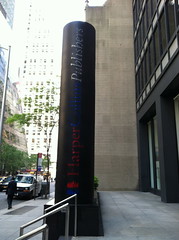a photo by LAUSatPSU on Flickr.
My name is Colleen Boyle, and I am a rising senior majoring in English. This summer, I am interning with HarperCollins Publishers at their New York City office. More specifically, I spend Monday through Thursday on the seventh floor of the company’s U.S. headquarters, which is home to the Harper, HarperBusiness, and Broadside imprints.
This summer, I began my internship assuming that I would be using my copy machine skills more than the skills that I have honed as a Liberal Arts student. After arriving at HarperCollins, however, I found that my cubicle gave me both a front row seat to happenings at one of the biggest publishing companies as well as a chance to use my English background.
I began my summer with “The Question.” It’s the one that most like to avoid, and it prompts the defense that every Liberal Arts major has to prepare:
“What are you going to do with your major?”
On move-in day at one of NYU’s residence halls, I met college students from around the country who were beginning their own internships. During these introductions, I ran into the question time and time again and resorted to using the “elevator speech” I have tucked away.
I can’t count how many times I have defended my major. But for me, a degree in English remained my focus and was a means to my envisioned end in publishing. My technical writing teacher always encouraged his students that writing is a key part of every profession and field.
With this in mind, I focused on my editing and tutoring classes, making note of skills I would need after college. But that is only half of my English education, and many of my classes focus on reading and analyzing texts. Little did I know that HarperCollins would be looking for those reading skills just as much as they were counting on a strong writing background.
On the first day of my publishing company internship, I was given a 400-page manuscript to read. I immediately reached for a red pen to circle misplaced commas, but my supervisor stopped me.
“Just tell me what you think,” she said.
Left alone with someone’s creative piece, I struggled with where to begin. Commas are easy to fix because they are governed by rules, and the Chicago Manual of Style was sitting on my shelf. Judging the appeal of the story is something much different. It was also something that I did constantly in my English classes. So, I set to work, channeling my inner English student.
“Character development” may seem like a word that belongs on a blackboard, but in the past four weeks, I have seen it in professional e-mail correspondences. A book will not sell if the readers can’t relate to the main character’s voice. Where are the themes? Or the resolution that leaves readers in tears, waiting for the sequel?
Almost every day, I am given a proposal or a manuscript and asked to come up with a reader’s report, which is like a SparkNotes version of the story followed by a review of the piece. The editors, whose desks are covered in such submissions, then use my work to make decisions about whether a manuscript is worth their time.
So what have I learned? To bask in the glory of my plot diagrams? No way. This experience has reassured me that Penn State’s English program has prepared me well for life with a diploma, both in reading skills and writing skills. This experience has also taught me that I need more, that I need to read everything that I can get my hands on.
Even though I spend most of my day at HarperCollins reading, my research, the “to-read list,” is growing by the minute. Typical English major? Guilty as charged.

